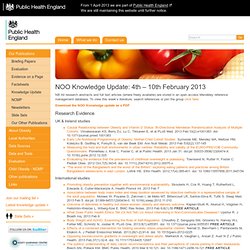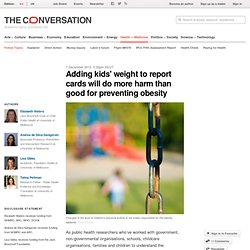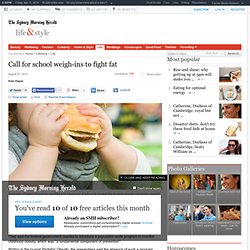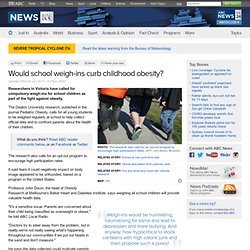

NOO Knowledge Update: 4th – 10th February 2013. NB All research abstracts and full text articles (where freely available) are stored in an open access Mendeley reference management database.

To view this week’s literature, search references or join the group click here Download the NOO Knowledge update as a PDF If you feel we have missed an item or you would like to contribute an item for consideration in future updates please contact: info@noo.org.uk NOO works in partnership with the Obesity Learning Centre (OLC): Visit the OLC for information on consultations, training and events. NOO is not responsible for the content of any of the external links in this resource. Delivered by NOO on behalf of the Public Health Observatories in England. Adding kids' weight to report cards will do more harm than good for preventing obesity. As public health researchers who’ve worked with government, non-governmental organisations, schools, childcare organisations, families and children to understand the complexity of obesity and effective healthy public policy, we find the article “F for fat” in today’s Fairfax papers both deeply disappointing and disturbing.

The article quotes former University of Melbourne vice chancellor David Penington suggesting that putting children’s weight on school report cards and linking them to physical education teachers would make an impact on childhood obesity rates. Penington, a high-profile academic who is very experienced in chairing public health initiatives and leading strong research foundations, is floating an initiative that runs counter to the evidence accumulated from over 15 years of careful, dedicated research that spans child health, obesity prevention, and community partnerships.
We have great evidence clearly showing that: #Scene_1. Australian children should be weighed and measured at school to combat the growing obesity pandemic, experts say.

Photo: iStock. Yes, it’s time to start weighing school kids. I like to “live and let live”, and I prefer not to pass black and white judgements on other parents; because when it comes to children having issues my feeling is “there but for the grace of God’’. But many times when I’m in the Melbourne Sports and Acquatic Centre pools with my kids I find myself feeling angry. Not with the large number of children waddling around with those heavy, apron-style guts and back-fat ripples you might see on a sedentary truckie, but with a society that is producing them—and letting them keep getting fatter. Who or what is to blame for this epidemic of morbidly obese kids? Is it a lack of parent-education about proper nutrition and the need to exercise? Or are parents just too busy to monitor these in their kids (quite possibly, given the huge workplace stress on many people still employed)?
Either way, today’s proposal by Melbourne researchers that school children be weighed gets the tick of approval from me. TODAY: Over-weight Kids on MSN Video. Weigh all children to tackle obesity: experts. All children should be weighed and measured as part of a school-based program to monitor childhood obesity in Australia, experts have proposed. Writing in Pediatric Obesity last week a team from the WHO Collaborating Centre for Obesity Prevention at Deakin University criticised the Federal Government for failing to routinely monitor children’s body measurements, which they said was a “fundamental component of obesity prevention”. “Obesity is one of the major public health concerns facing Australia, yet, currently, there are no routinely collected data to effectively track the problem.” Setting up a school-based “opt-out” system - where children would be measured unless a guardian withdrew consent - was the best and most cost-effective solution, the authors said.
Weighing kids in schools. Would school weigh-ins curb childhood obesity? Updated Wed 26 Jun 2013, 12:25pm AEST Researchers in Victoria have called for compulsory weigh-ins for school children as part of the fight against obesity.

The Deakin University research, published in the journal Pediatric Obesity, calls for all young students to be weighed regularly at school to help collect official data and to confront parents about the health of their children. What do you think? Read ABC reader comments below, or on Facebook or Twitter. Would school weigh-ins curb childhood obesity? The Deakin University research, published in the journal Pediatric Obesity, calls for all young students to be weighed regularly at school to help collect official data and to confront parents about the health of their children. What do you think?
Read ABC reader comments below, or on Facebook or Twitter. The research also calls for an opt-out program to encourage high participation rates. It said fears it could negatively impact on body image appeared to be unfounded, based on a program in the United States. Professor John Dixon, the head of Obesity Research at Melbourne's Baker Heart and Diabetes Institute, says weighing all school children will provide valuable health data. "It's a sensitive issue. "Doctors try to steer away from the problem, but in reality we're not really seeing what's happening throughout our communities if we put our heads in the sand and don't measure.
" He says the data collected could motivate parents to take action.